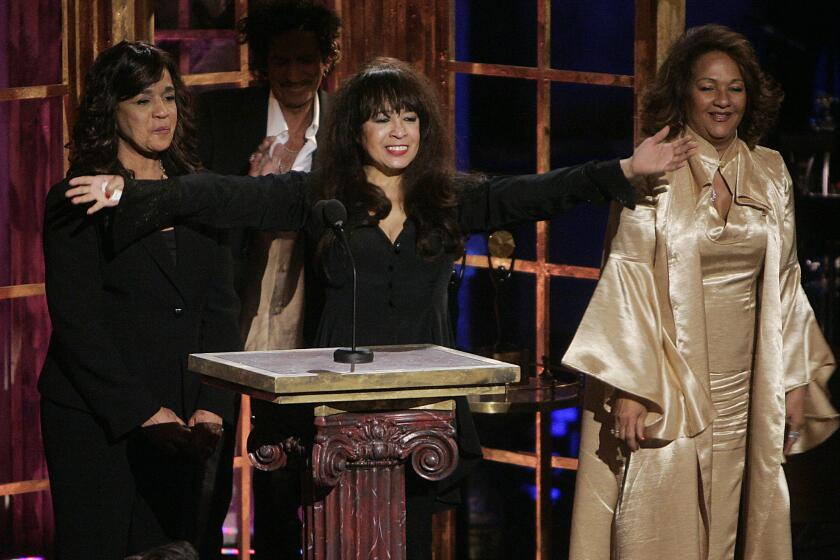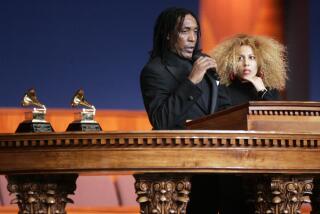Ronnie Spector, ’60s girl-group icon who sang ‘Be My Baby,’ dies at 78

Ronnie Spector, who sang such indelible 1960s hits as “Be My Baby” and “Baby, I Love You” as the leader of the girl group the Ronettes, has died.
- Share via
Ronnie Spector, whose towering voice propelled indelible early 1960s hit records including “Be My Baby,” “Baby, I Love You” and “Walking in the Rain,” died Wednesday after a brief battle with cancer. She was 78.
Spector, born Veronica Bennett, teamed with her older sister Estelle and their cousin Nedra Talley to form the Ronettes in 1957. They went on to become one of the most enduring trios of the so-called girl-group era, and long after the group, and her marriage to record producer Phil Spector, disbanded, she was hailed as a symbol of artistic and personal resiliency.
“She was with family and in the arms of her husband, Jonathan,” her family said in a statement. “Ronnie lived her life with a twinkle in her eye, a spunky attitude, a wicked sense of humor and a smile on her face. She was filled with love and gratitude. Her joyful sound, playful nature and magical presence will live on in all who knew, heard or saw her.”
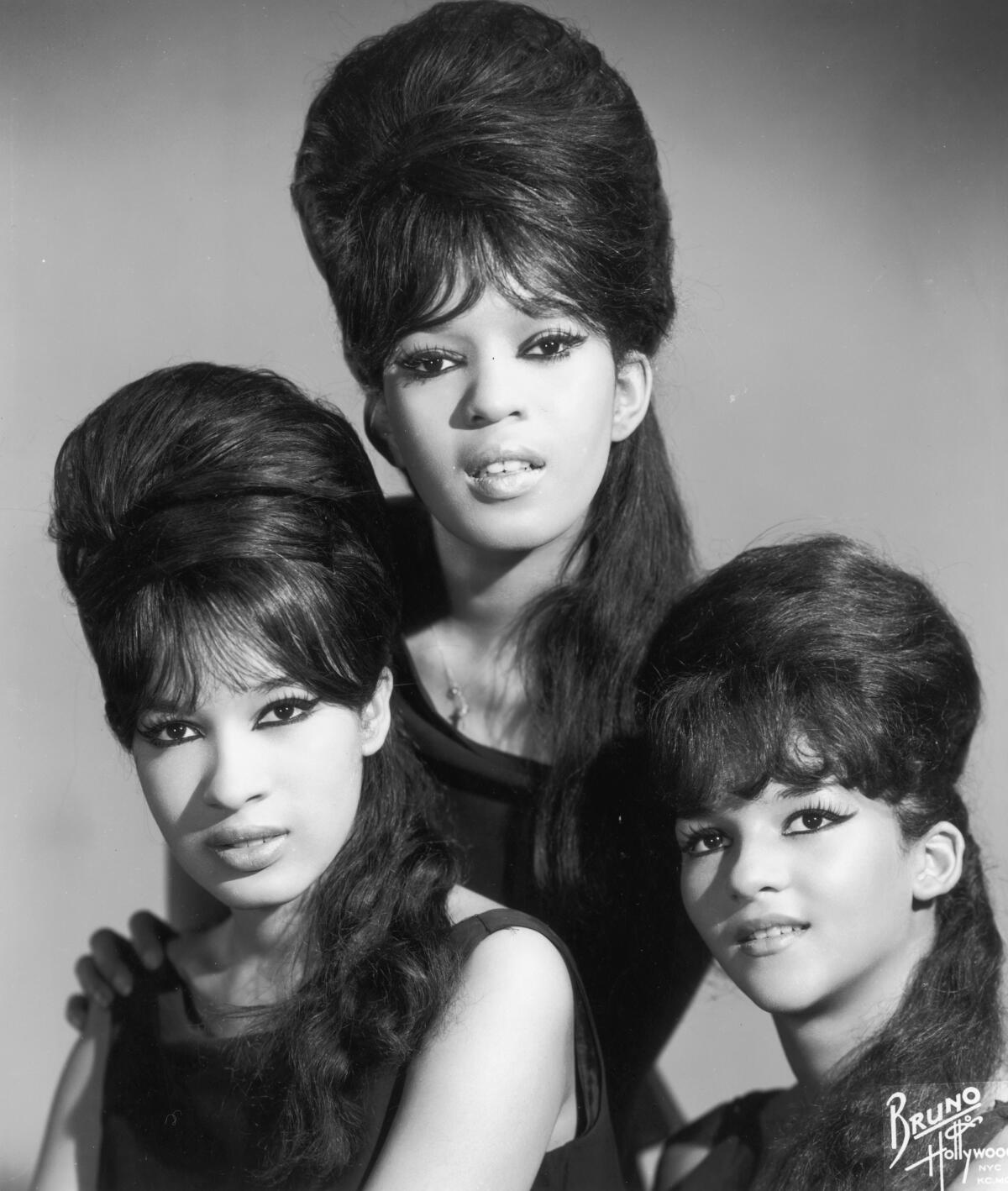
Spector — then still Bennett — famously promised a similar brand of attention in “Be My Baby.” “I’ll make you happy, baby, just wait and see / For every kiss you give me I’ll give you three,” she pleaded.
The future Ronnie Spector earned her most prominent commercial success early on, when Phil Spector signed the group in 1963. They promptly fell for each other.
“I was so much in love. That energy comes back to me every time: when I’m singing ‘Be My Baby,’ I’m thinking of us in the studio,” Ronnie said in a 2013 interview. The song, which peaked at No. 2 on Billboard’s Hot 100 chart in October 1963, earned a second life when Martin Scorsese featured it in the opening montage of his gritty 1973 crime drama “Mean Streets.”
She became Mrs. Phil Spector in 1968. A few months later, he announced he was going into semi-retirement. “I didn’t realize I’d have to retire along with him,” Ronnie later told The Times. “If I had known I wasn’t going to sing, I wouldn’t have married him.” After four years of forced isolation and domestic abuse, she divorced Spector in 1972.
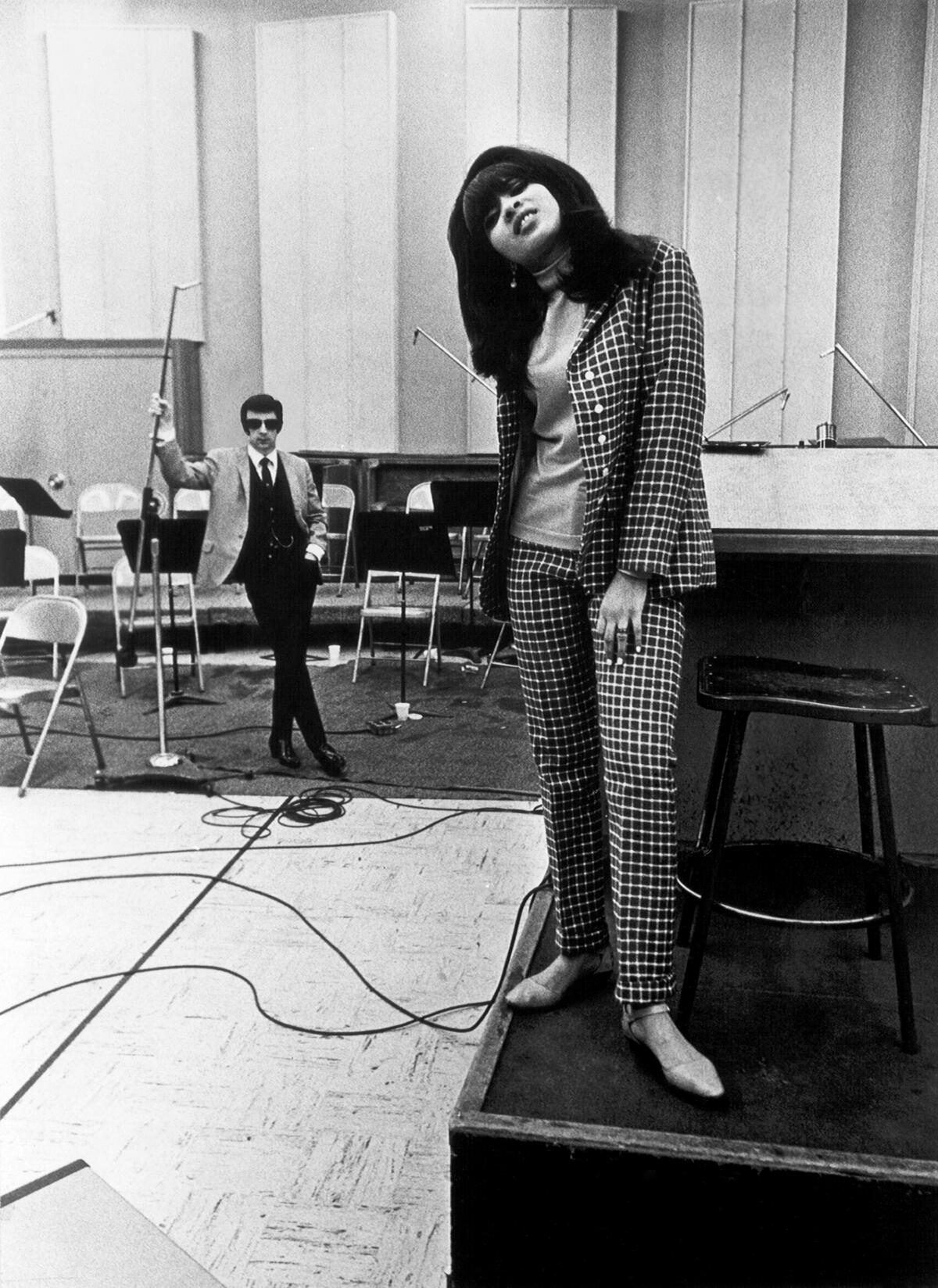
Ronnie Spector was a muse, friend and inspiration to artists including John Lennon, David Bowie, Bruce Springsteen, Amy Winehouse and Billy Joel — who wrote “Say Goodbye to Hollywood” for her — and her charisma was legendary. With her tightly packed beehive and long black hair cascading down her back, stylish, form-fitting fashion and self-assuredness, Spector was the focus of any room she entered.
“The first time I ever went to heaven was when I awoke with Ronnie (later Spector!) Bennett asleep with a smile on her face. We were kids. It doesn’t get any better than that,” Keith Richards wrote of their mid-1960s affair in “Life,” his memoir.
The Rolling Stone inducted the Ronettes into the Rock & Roll Hall of Fame in 2007.
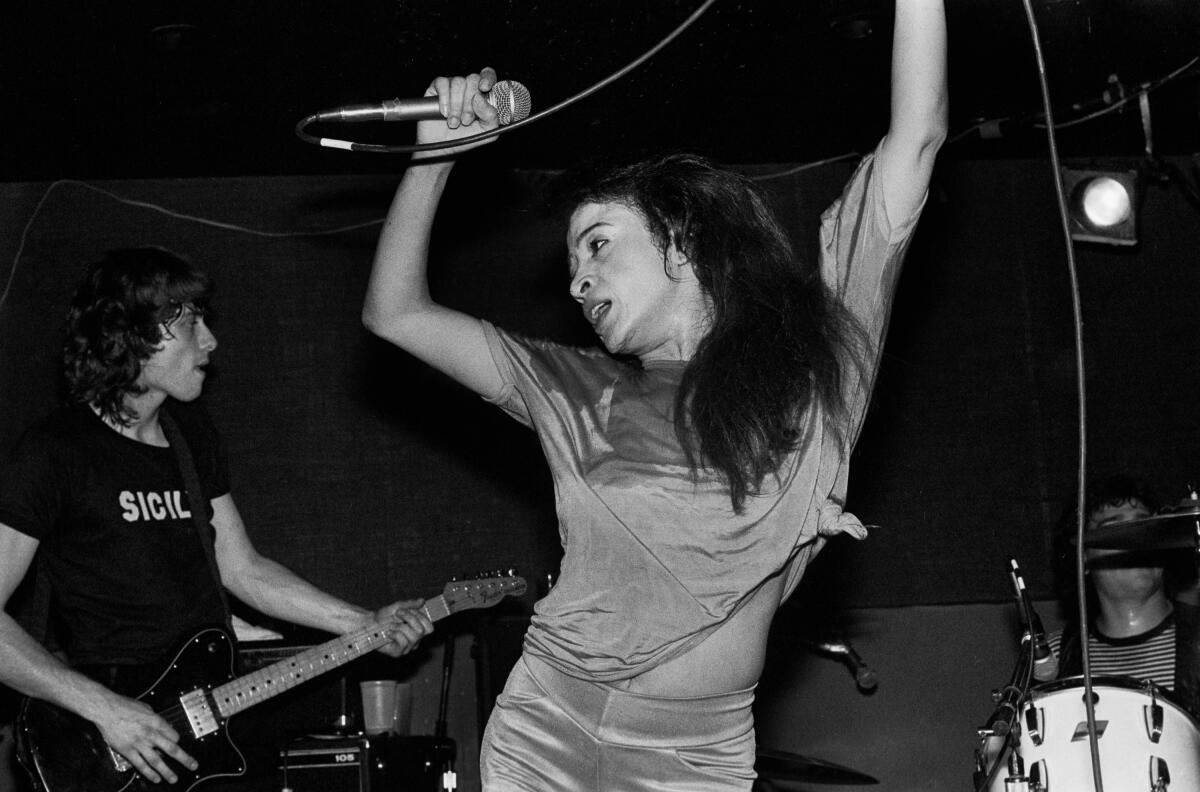
Born Aug. 10, 1943, Veronica Yvette Bennett grew up in Manhattan’s Washington Heights section, one of two sisters to a mother of Cherokee and Black heritage and an Irish American father. As teens inspired by the Chantels’ smash hit “Maybe,” the Bennett siblings and their cousin Nedra started singing at sock hops before landing a regular gig at the Peppermint Lounge. Soon they were spotted by scouts for famed DJ Murray the K’s regular “Caravan of Stars” events at the Fox Theater in Brooklyn. The group signed to Colpix in 1961 and released a single, “I Want a Boy,” as Ronnie and the Relatives.
The single didn’t fare well, and though accounts vary on how Ronnie and the group connected with Phil Spector in early 1963, the trio traveled to Mira Sound Studios in New York to work on some sessions. Not long after, Spector invited the Ronettes to record at Gold Star Studios in Hollywood, the studio most famously connected to Spector’s so-called Wall of Sound.
They recorded “Be My Baby” at Gold Star with backing vocalists that included the other Ronettes as well as labelmate Darlene Love, percussionist Sonny Bono and his girlfriend Cher. Within a month of release, it was near the top of the Hot 100.
One listen confirms why. Featuring lyrics co-written by Brill Building experts Jeff Barry, Ellie Greenwich and Phil Spector, Ronnie lays out the scene with a blissful ease, cutting through her producer’s would-be Wall like a razor through red velvet. Its timelessness is predicated on her energy, which soars across octaves while conveying the lyrics’ desperate, obsessed emotion.
The Ronettes continued their success when they joined forces with Love, the Crystals and Bob B. Soxx & the Blue Jeans to record “A Christmas Gift for You From Phil Spector.” Now a seasonal classic, the 1963 album features the Ronettes’ essential renditions of “I Saw Mommy Kissing Santa Claus,” “Sleigh Ride” and “Frosty the Snowman.”
Another breathtaking classic of the era, “Do I Love You?,” takes flight despite her producer’s best efforts at overwhelming her voice with instrumental volume. A song about undying love that appears on the Ronettes’ 1964 debut album, “Presenting the Ronettes featuring Veronica,” nearly six decades later the explosive recording provides a window into not only her natural talent but, in retrospect, the power dynamic that helped doom Ronnie’s career as a solo artist.
On “Do I Love You?” and other singles, Phil Spector, seeming to understanding Ronnie’s brilliance and wincing at its beauty, sounds like he’s working quash her spirit. At the time he controlled every aspect of Ronnie’s artistic output: He picked the Ronettes’ songs, decided how they sounded and whether they would be released. “Do I want to run and kiss your lips / Say you’re my loving guy?” Ronnie sings on “Do I Love You?” Yes, reply the Ronettes in sung response, as if inhabiting their notoriously insecure producer’s desire.
The Ronettes appeared with the Beatles during the group’s 1966 American tour, but split up that same year.
Singer Ronnie Spector’s many friends and fans in music and beyond reacted to her death Wednesday. “Her mark on rock and roll is indelible.”
In 1971, Spector signed to Apple Records to release the single “Try Some, Buy Some,” and in 1973, she attempted to reboot the Ronettes with two new members. Neither put her back in the spotlight, but her striking voice continued to resonate. At the recommendation of Springsteen, Spector joined Southside Johnny and the Asbury Jukes on the 1976 Springsteen-penned song “You Mean So Much to Me.”
Spector recorded her debut solo album, “Siren,” in 1980. It failed to chart.
But in 1986, during the height of the MTV era, Spector’s career earned renewed attention when she starred in rocker Eddie Money’s hit — and accompanying video for — “Take Me Home Tonight.” Revisiting a melody line from “Be My Baby,” Spector not only sings part of the refrain but she’s also the subject of the lyric itself: “Take me home tonight / Listen honey, just like Ronnie sang, ‘Be my little baby.’”

Though her output was light in the 1990s, the Ronettes’ energy from three decades prior continued to spark passion. In 1999, Spector teamed up with indie label Kill Rock Stars, home to punk and alternative acts including Bikini Kill and Elliott Smith. Enabled and encouraged by lifelong fan Joey Ramone, she released “She Talks to Rainbows,” an EP featuring songs written by artists including Ramone, Brian Wilson and Johnny Thunders.
In 2001, after more than a decade of litigation, she and her bandmates won a lawsuit against Phil Spector for unpaid royalties and licensing income on Ronettes recordings. The victory was just part of a battle that Spector had long fought against her former husband. Though the financial windfall, $2.6 million, delivered monetary compensation, she spent the rest of her life fighting against the perception that her ex-husband, who was convicted of the 2003 murder of Lana Clarkson and died in prison in 2021, was responsible for her artistic success.
Most prominently, Ronnie Spector’s 1990 memoir, “Be My Baby: How I Survived Mascara, Miniskirts, and Madness, or, My Life as a Fabulous Ronette,” offered firsthand accounts of the ways in which her domineering ex-husband starved her of opportunity and diminished her contributions. Her memoir, which is being republished in May, has been optioned for a biopic starring Zendaya.
On news of her death, artists lined up to celebrate Spector’s searing voice and spirited life.
“I just heard the news about Ronnie Spector and I don’t know what to say,” wrote Brian Wilson, who once called “Be My Baby” his favorite song and whose group’s “Don’t Worry Baby” was a Ronettes homage. “I loved her voice so much and she was a very special person and a dear friend. This just breaks my heart. Ronnie’s music and spirit will live forever.”
She is survived by her husband, Jonathan Greenfield, and two sons, Jason and Austin.
More to Read
The biggest entertainment stories
Get our big stories about Hollywood, film, television, music, arts, culture and more right in your inbox as soon as they publish.
You may occasionally receive promotional content from the Los Angeles Times.
